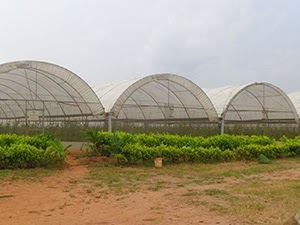 |
| Technology required to fabricate efficient farm tools |
Crude oil is the new enemy of the planet. Whether it is through its
use or by its trade every country is looking for a way to do without it.Technology and Agriculture are the two industries that can profitably
fill the economic gap that will be created if oil dependent countries
diversify.
Agriculture is about food cultivation and everything that is directly
or indirectly related to it. Agribusiness is the commercialization of
agriculture especially using technology.
My interest in Agribusiness emanates from my business of retailing
fresh farm produce on my company's website www.easyshopeasycook.com . Our need
for traceability, freshness, quality and cost reduction lead us to backward integration; which
is a business model whereby a company
takes direct control
of how its
products are supplied.
In our own case we need to have direct control or influence in
the farms that supply our company in order to trace the produce, eliminate
adulteration, enforce food safety policies, improve profit margins and
make our company more competitive.
 |
| We need more local research Institutes to improve our seeds |
The more I got involved in the process the more I realized I knew very
little about it. I got involved with some farm produce associations and I found out we
all know so little hence the dearth our country is in. So this series is for me to learn about the business of agriculture,
share with others and learn from the feedback I receive from everyone.
I have
called it #AgriBiz4Dummies because I plan to be as simple as possible to
remove the complication hindering people from getting involved to help build
the industry.
 |
| The business of Agrochemicals |
Agribusiness includes agrochemicals, breeding, crop production,
distribution, farm machinery, processing, seed supply, marketing, retail sales
as well as the education and technology behind all these. My interest is not really in the academic but the practical things
being done around the world in this sector. I will highlight what Nigeria and
Africa are doing and what more we must do to meet up and possibly dominate this
sector globally.
 |
| Greenhouse technology and materials |
China has been equated to Manufacturing; I strongly believe
Agribusiness is ours to take. Africa should be the food basket of the world
because the land, the climate and the people are available here, all we need now
is the technology and will to back it up.
I hope to hear from you here or tweet me @lagosshopping, it becomes more interesting that way.
Cheers.
















